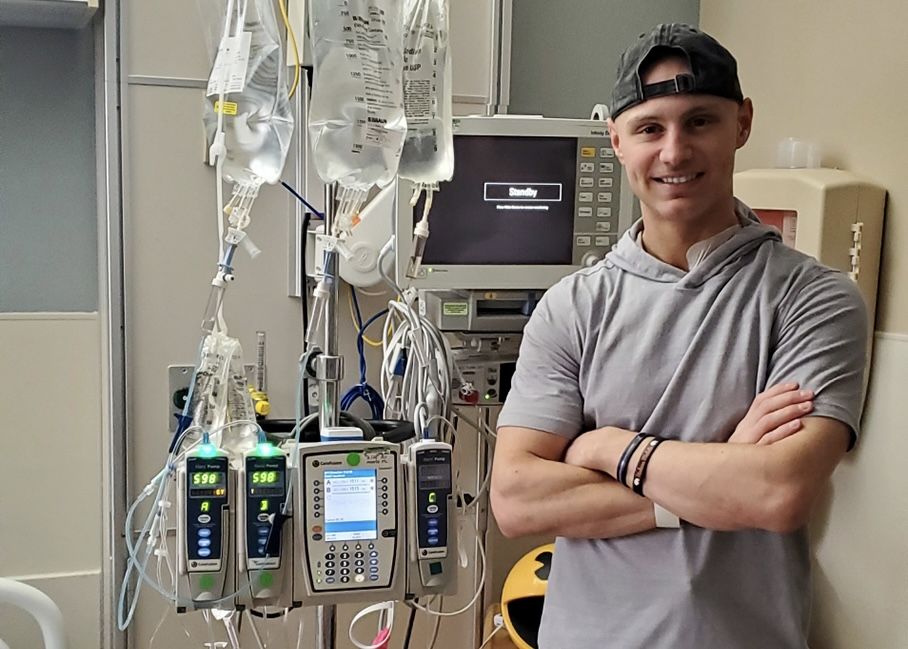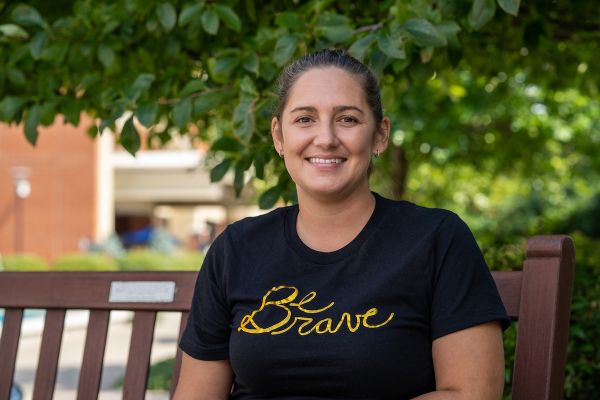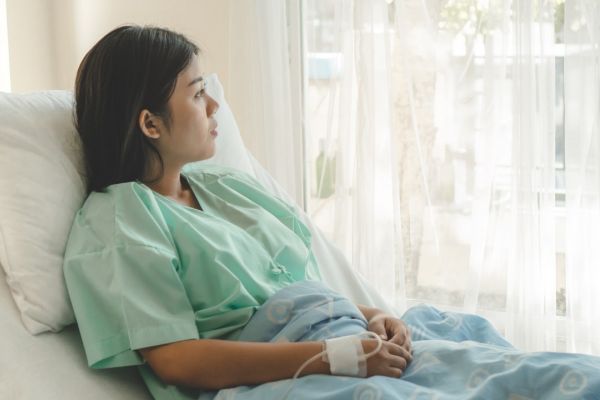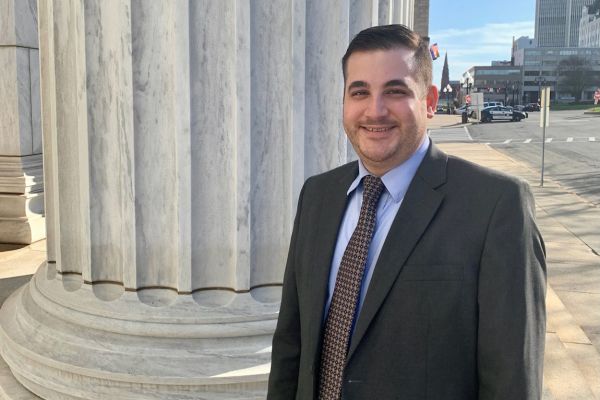Erik Gorenflo was a recent college graduate, just beginning his career and ready to see where this next chapter would take him. Born and raised in Williamsville, Erik moved to Syracuse in 2013 to study finance and information systems at Le Moyne College. At 23, his first job after graduation was in private wealth management, where he worked as a financial consultant.
One morning while getting ready for work, he felt an intense pain when the stream of water from the shower came in contact with his genitals. “I got out to check it and found a little, tiny lump,” Erik recalls. He immediately called his doctor in Syracuse and within two weeks had an ultrasound. His primary care physician referred him to a urologist who, upon examination, told Erik “This is 100% testicular cancer. Are you good for surgery next week?”
Erik underwent an orchiectomy – the removal of the affected testicle – at a hospital in Syracuse. The pathology report following the surgery revealed the cancer had begun to spread to his lymph nodes, an occurrence called lymphovascular invasion. “I ended up going through a couple rounds of chemotherapy for that, but nothing major,” he says. “I was still going to work; no one even knew I had cancer besides my close friends and family.” After a few rounds of low-dose chemotherapy, Erik was cancer-free.
Deciding to share his story
“Nine months later I started getting really intense pain in my back,” Erik recalls. “I was working out quite a bit, so I thought it was normal, like maybe I did something deadlifting. I was spending hundreds of dollars on chiropractor appointments and physical therapy.”
But at a routine follow-up scan, doctors discovered the cancer had recurred in his abdomen. A softball-sized tumor was encasing his abdominal aorta and pushing against his kidney. “That explains why I have this pain, it’s a big tumor pushing on the muscles in my back,” he remembers thinking.
Erik needed a more intense treatment with chemotherapy. He also decided it was time he told more people in his life what he was going through. He made the decision to begin sharing his experience on Instagram, posting pictures of himself during treatments with his doctors, nurses and support system. “I lost my hair, I lost a ton of weight, but I still kept a positive attitude,” Erik says. “I was like ‘I’m not going to let this defeat me.’
“I didn’t tell people the first time I had cancer. Maybe I was a little embarrassed, being 23 and going through testicular cancer. Maybe it hurt my ego a little bit, even though I didn’t do anything wrong,” he recalls. “I really documented a lot during my second journey. I thought maybe I could do something special and spread awareness for men’s health. And that’s exactly what I did.
“I’ve had literally hundreds, if not thousands, of people messaging me like ‘My cousin, brother, uncle, dad is going through something similar, what advice do you have?’ I’m happy to talk to them.”
Young Adult Program at Roswell Park
Our Young Adult Program offers nationally designated comprehensive cancer care, plus support and services specifically designed to help you and your family now — and for years to come..
Learn MoreExpanding his support team
After four months of intense chemotherapy in Syracuse, Erik was again cancer-free and in remission. While visiting his family in Buffalo for the summer, he met his now-fiancé, Kelsey Miosi at a neighborhood barbeque his mom hosted. “She’s my mom’s next-door neighbor, and we just hit it off right away,” though he admits his mom had a hand in facilitating their relationship.
Kelsey was at his side when his cancer relapsed a third time, in 2019.
“I went for another six-month scan and they found that same tumor in my abdomen had grown back. That was when I needed a stem cell transplant here at Roswell Park.” The Transplant & Cellular Therapy Center at Roswell Park Comprehensive Cancer Center offers some of the most advanced technology and clinical trials available in the region.
Erik’s stem cell transplant, led by Philip McCarthy, MD, took place over the course of three months. “It was pretty brutal,” he remembers. “I was in the hospital for three weeks at a time, then I was out for four, and came back for three more. I got out of the hospital two days before Christmas.” Following the transplant, he under underwent retroperitoneal lymph node dissection surgery (RPLND), an operation performed to remove lymph nodes located deep in the abdomen where the testicular cancer had spread.
In total, nine cancerous lymph nodes were removed, and his cancer went into a remission that has endured for nearly two years.
The light at the end of the tunnel
When looking back at this journey, he has an infectiously positive attitude, “I think everything happens for a reason. If I never got sick, I would never have met Kelsey because I wouldn’t have moved back home.”
He began to plan for a future with her, reflecting on the journey they experienced through his third diagnosis. “I was thinking of somewhere I could propose that’s sentimental,” he says, when he remembered watching the televised Tree of Hope Lighting Ceremony during his treatment at Roswell Park in 2019. He chose to propose in Kaminski Park, nearly two years to the day after watching the lighting of the Tree of Hope from his hospital room.
Erik credits Kelsey, friends and family, in addition to his college professors, nurses and doctors for keeping his spirits high throughout treatment. “If you’re trying to do this alone, it’s not easy. I regret not sharing my journey sooner, because I feel like if I had made it more well-known, I would have had a bigger support system going through it the first time.”
When it comes to young adults going through a cancer diagnosis, Erik stresses the importance of asking for help. “Don’t be afraid to reach out and ask for someone to talk to,” he says. “I think younger people try to take it on themselves or think they’re tough enough and don’t have to talk to anyone.” He says whenever he can, he’s happy to be that person for someone else. “There are tons of young adult cancer survivors, like myself, that would be happy to talk to any young person.”
Editor’s Note: Cancer patient outcomes and experiences may vary, even for those with the same type of cancer. An individual patient’s story should not be used as a prediction of how another patient will respond to treatment. Roswell Park is transparent about the survival rates of our patients as compared to national standards, and provides this information, when available, within the cancer type sections of this website.



